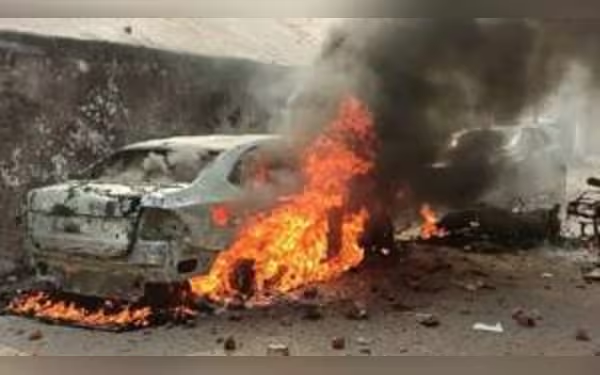Monday, December 23, 2024 09:32 AM
Sambhal Violence: Tensions Rise After Deadly Clashes
- Four killed in violent clashes in Sambhal.
- Police accused of using lethal force during protests.
- Internet services suspended to maintain order.
 Image Credits: nation_pk
Image Credits: nation_pkFear grips Sambhal as violent clashes lead to four deaths, raising concerns over communal tensions and police actions.
In recent days, the Indian city of Sambhal has been engulfed in fear and tension following violent clashes that resulted in the tragic deaths of four individuals. This unrest erupted during a court-ordered survey of the Shahi Jama Masjid, a mosque with a long history, which some Hindu groups claim was built on the site of a demolished temple. The situation escalated quickly, leading to confrontations between police and protesters, primarily from the Muslim community.
On Sunday, as the survey was underway, protests erupted, with demonstrators reportedly throwing stones at the police. In response, law enforcement used teargas and rubber bullets to disperse the crowd, resulting in injuries to at least 20 police officers. However, the families of the deceased have accused the police of using lethal force, claiming that their loved ones were shot during the chaos. The police have firmly denied these allegations, stating that they did not open fire on the crowd.
In the aftermath of the violence, the city remains under heavy police presence, with numerous officers and paramilitary forces deployed to maintain order. Local authorities have imposed restrictions on outsiders, including social activists and politicians, preventing them from entering the city until December 1. Internet services have been suspended, and schools have been closed to ensure safety and prevent further unrest.
The emotional toll on the families of the victims is profound. Idro Ghazi, a grieving mother, shared her heartbreak over the loss of her son, Naeem, who she claims was not involved in the protests but was shot while on his way to the market. Similarly, Nafees mourns his 22-year-old son, Bilal, who was also killed during the violence. Both families have expressed their fear of confronting the police, with Idro stating, “We do not have the courage to fight the police and the government.”
As the situation unfolds, the Sambhal police have initiated legal action against over 2,700 individuals, including a local member of parliament, Zia-ur-Rehman Barq, accusing him of inciting the protests. Barq has denied these claims, providing evidence of his absence during the incident. The political landscape in Uttar Pradesh is tense, with opposition parties criticizing the ruling Bharatiya Janata Party (BJP) for allegedly attempting to divide communities along religious lines.
The controversy surrounding the Shahi Jama Masjid is part of a broader pattern of disputes in India, where Hindu groups have frequently claimed that historical mosques were built on the ruins of temples. This particular incident highlights the fragile state of communal relations in the country, raising questions about the motivations behind such surveys and the potential for further violence.
As the people of Sambhal navigate this difficult period, it is crucial for authorities to prioritize dialogue and understanding among communities. The tragic loss of life serves as a stark reminder of the need for peaceful coexistence and the importance of addressing grievances through constructive means rather than conflict. Only through empathy and communication can the cycle of violence be broken, paving the way for a more harmonious future.













